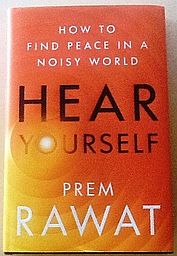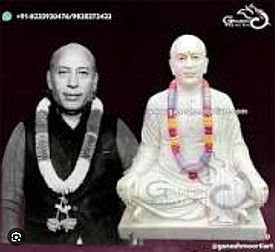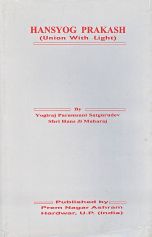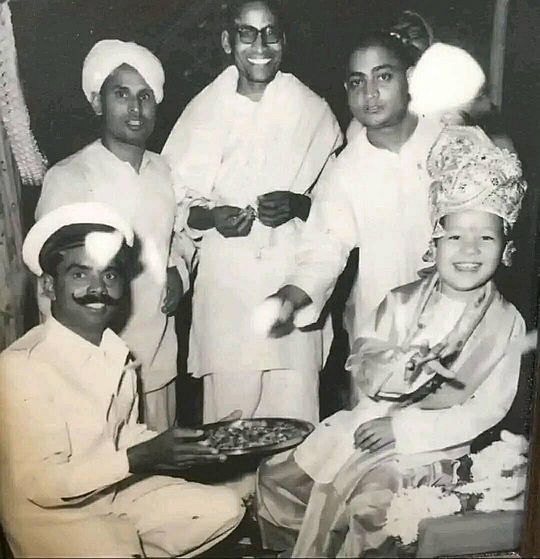
 Historical Revisionism in "Hear Yourself" by Prem Rawat
Historical Revisionism in "Hear Yourself" by Prem Rawat
I've called it revisionism but really its nothing but outright lies and deceit. His mother disinherited him in 1974 due to his "playboy" behaviour which included drunkenness, marijuana smoking, overly luxurious living, eating meat and excessive (for a Satguru) lust for sex. These accusations were later confirmed by close followers though they were kept secret from his other followers at the time.
Rawat's father had very strong beliefs and they were part of a part of the Hindu tradition. He appointed Himself Satguru and called Himself the current Incarnation of God and convinced many people to believe in Him, as did hundreds of other Indian gurus. Hans Rawat wrote his own scriptures and created a huge temple complex called Prem Nagar where statues of him are worshipped to this day.
In "Hear Yourself" Prem Rawat revisits earlier attacks on his mother in the chapter, THROWING COINS TOWARD GOD:
To have this story in this book Rawat has to strip it of all its original meaning which was to demonstrate that his mother and deposer never understood that her husband and his father actually was the Lord of the Universe (brahmaand ke bhagavaan) just as they all said he was and only fools deride him. It was a joke, how stupid could she be? And the Western premies laughed hilariously, they were in on the joke, though their laughter at his jokes was always a bit too much. Maybe Rawat did write this chapter as its self-contradictory. If he wasn't capable of sending her to heaven then the joke was on him.
But for the most part I lived in the midst of extraordinary Hindu devotion. In fact, my mother was a staunch Hindu, but my father was free of similarly strong beliefs because he wanted to know rather than just believe. He had spent his life looking for - and then speaking about - wisdom. For him, it wasn't to be found in the books and it wasn't enshrined in masonry.
Every time the family left town on a trip, we would pass roadside temples. It was commonplace for people to roll down their car window and throw a coin toward God, and there were people around to collect coins and take them into the temple, although I used to suspect that some ended up in their pockets. Whenever we passed one particular temple, my mother would always throw a coin, and every time my father then said: "Why do you do this?" She would reply: "So I can go to heaven." And my father would respond: "Give me the money, and I'll make sure you go to heaven." But she would just roll her eyes, roll down the window, and throw out the coin, discharging her devotion. I would be sitting in the back of the car.
- He claims she was a died-in-the-wool, staunch Hindu i.e. someone who believes but does not Know as Prem and his true believers Know. When his mother throws coins out of the car to a roadside temple Rawat quotes his father: "Give me the money, and I'll make sure you go to heaven" as if this minor Indian guru really was God incarnate and could do such an absurdity at his whim. The only way young Prem could live in the midst of extraordinary Hindu devotion was if his father sanctioned it, which of course he did. His father was the source and object of this extraordinary Hindu devotion which he preached, he taught and he demanded.
 He also uses this story to claim that his "father was free of similarly strong beliefs because he wanted to Know rather than just believe. Believing you can send someone to heaven is a pretty strong belief and Prem believed it to be true.For anyone who wants to see what strong beliefs Hans Rawat, Prem's father, had there is a list of quotes from his speeches in which he defines many of those strong beliefs and for anyone who wishes to research further here is a list of all the transcripts of his speeches we have on this site. He scathingly and publicly attacked his spiritual competitors when able and Prem proudly told of one such occasion. In 1954 at a Parliament of Religions he said what could be a bigger fraud than the Hare Krishnas?
He also uses this story to claim that his "father was free of similarly strong beliefs because he wanted to Know rather than just believe. Believing you can send someone to heaven is a pretty strong belief and Prem believed it to be true.For anyone who wants to see what strong beliefs Hans Rawat, Prem's father, had there is a list of quotes from his speeches in which he defines many of those strong beliefs and for anyone who wishes to research further here is a list of all the transcripts of his speeches we have on this site. He scathingly and publicly attacked his spiritual competitors when able and Prem proudly told of one such occasion. In 1954 at a Parliament of Religions he said what could be a bigger fraud than the Hare Krishnas?- "For him, wisdom wasn't to be found in the books" - If wisdom wasn't to be found in books then why did Shri Hans Rawat write his own scriptures which you can read on this site and he often quoted the Bhagavad Gita, the Ramayana, the Mahabharat(a), the Upanishads, the Guru Granth Sahib, etc and Indian spiritual authors such as Shankara, Tulsidas, Vyas(a), Guru Nanak, Mirabai, Kabir, etc. The references are too numerous to document.
- "and it wasn't enshrined in masonry" - Shri Hans Rawat began building a temple and a shrine to Himself in marble and masonry called Prem Nagar in the centre of the Indian spiritual pilgrimage and tourism area and they're still building as you read.
Rawat's earliest recounting of this story was on the 8th November 1979 at the Hans Jayanti Festival in Kissimmee Florida.
![]() Its appropriate that he tell this story at a festival in honour of the former Lord of the Universe, Yogiraj Param Hans Satgurudev Shri Hans ji Maharaj, because it reminds us that Hans Rawat was also the Incarnation of God and the Savio(u)r even if he claims his wife didn't recognise this. It was a Thursday afternoon so the Hans Jayanti event had only just started. If taken at face value it seems that Prem Rawat actually believed his father had divine powers and that he, himself, had them too. As he also made similar statements many times then one could easily assume he truly believed in his own divinity. However, using the Ancient Wisdom of Shri Ockham ji, one quickly sees that the truth is that Prem Rawat was and is a fantasist and a liar. These tales of his mother's charity and involvement in local temple life, which Rawat sees as disbelief in in his Father's divinity only makes sense if he believes his audience of premies also believes in his father's supreme supernatural powers and of this we can be quite sure.
Its appropriate that he tell this story at a festival in honour of the former Lord of the Universe, Yogiraj Param Hans Satgurudev Shri Hans ji Maharaj, because it reminds us that Hans Rawat was also the Incarnation of God and the Savio(u)r even if he claims his wife didn't recognise this. It was a Thursday afternoon so the Hans Jayanti event had only just started. If taken at face value it seems that Prem Rawat actually believed his father had divine powers and that he, himself, had them too. As he also made similar statements many times then one could easily assume he truly believed in his own divinity. However, using the Ancient Wisdom of Shri Ockham ji, one quickly sees that the truth is that Prem Rawat was and is a fantasist and a liar. These tales of his mother's charity and involvement in local temple life, which Rawat sees as disbelief in in his Father's divinity only makes sense if he believes his audience of premies also believes in his father's supreme supernatural powers and of this we can be quite sure.
"There are some people who want to bet on everything. I remember that coming out of Dehra Dun, there was this road. And after a tunnel, there was this temple. And every time Mata Ji would drive by this temple, she would take a little money and throw it towards the temple. One time, I was there and Shri Maharaj Ji was there. So she took out some money to throw it towards the temple. And Shri Maharaj Ji said, "Why don't you give it to me, instead of giving it to the temple? I can give you what the temple can give you." She got mad. "What do you mean?" These are the kind of things that people have concepts about.
What Rawat's father means is: I can give you the salvation and liberation that the temple priests only pretend they can give you. Later that day the young Rawat "gave satsang" again and he made certain premies understood exactly what he meant.
So really, we have to be straight. And it's like that example that I gave today. If all these concepts that Mata Ji used to have about throwing a dime … Every time she would drive by this temple, coming and going, she would open the window and throw money out. And just after that I was thinking about this, and it was like - so incredible. Shri Maharaj Ji, who had every power - the person, the liberator on this Earth - says to her, "Why don't you give me the money instead of throwing it out the window, and I'll liberate you?" I mean, that's the most incredible offer anybody could have ever gotten. … So that incredible Guru Maharaj Ji has that potential, has that power. Because he wasn't joking. I don'tthink he was joking. He liberated me.
He retold the story in Miami, 31st July 1982.
Premies applaud when Rawat says something that implies or explicitly states he is God incarnate with divine powers. In this case they understood that as His father and guru before him, Hans Rawat, could "give salvation" through His Divine Grace, the young Rawat could do the same. This was a year or so before he summarily shut down Divine Light Mission, changed his name from Guru Maharaj Ji to Maharaji and his public persona, dropping off the long-haired Krishna copycat shtick.
India has temples, India has more temples than corners on the road, really. There, before you take a corner you can find a temple, while you're taking a corner you'll find a temple and after you finish the corner you'll still find a temple and they're all three different and as that person feels like I have seen incredible devotion from people where I was pretty much went to school and was raised was in this valley, this place and to get out of there you had to drive through windy roads and tunnels and after this one tunnel was this incredible temple, incredible temple and believe me you know what the common practice to pay homage at this temple was while you were entering the tunnel you knew that temple was right after the tunnel so you undo your window and you got your quarter or dime or your paisa right in your hand, right, and as the car still trucking, because you don't want to stop, you just pay him and shoo right into it. That is how people paid homage at this place and you know my mother always did this, this is ritually she always did this.
My father was sitting in the front, Shri Maharaji was sitting in the front and so she got her little coins in her hand to throw this then he asked her, "What are you going to do with this?" "I'm going to throw it at the temple." He said, "Why?" "Well because you know maybe I'll have salvation, or I'll be free. I'll have liberation." "So do you know by throwing this coin you'll get it? " She said, "No, everybody does it." He said, "Give me the coin I'll make sure you do have liberation." (applause) And uh, she didn't give him the coin (laughter) she just tossed it out the window (laughter) and I just about died laughing. (laughter) And there goes the liberation, poof, right out the window and this I witnessed myself.
 He retold the story at his "Birthday Program" Miami, 9th December 1983.
He retold the story at his "Birthday Program" Miami, 9th December 1983.
The premies recognised the story and laughed even before he got to the part where she threw out the coins. Rawat didn't even mention who "this person" was but they all knew about whom he was talking. They laughed their knowing in-group heads off (so to speak) as if this dead, minor Indian guru really had been God and really could grant salvation and this was in 1983 not 1783. They weren't laughing at His absurd megalomania or boorish patriarchy, they're laughing at this Indian wife and mother giving some charity and observing the religious rituals of her culture but those rituals were going on in their home while his father was still alive. Should we laugh at him also? Prem was publicly pretending to disown His own Divinity at that time and in that very speech so I guess he disowned his Daddy's divinity as well so who is the joke on here? His followers may have been nice people but they certainly covered that with a veneer of shallow mean-spirited ignorance at the Lotus Feet of Prem Rawat and his mother was correct, he really was a dope smoking drunken greedy meat-eating lying phony when she disowned and deposed him and since.
"There's this one person I knew very well and in fact this person every time we would drive back from Delhi to where I was Dehra Dun or Prem Nagar or wherever we were going, in India there's abundance of temples and this person had a few favorite temples and every time we were the car was driving of course and the car would pass by a temple, the person would know that the car is going to be passing in a few minutes by a temple, the person would open up uh you know whatever it was, a wallet or a purse or whatever it was (laughter already) take out the uh take out the uh the 25 you know worth cents in Indian paises, get it ready, the temple approaches, boom boom boom, down with the windshield and a nice chuck out the window and roll it back up. My father asked one time what this person was doing throwing all this money out the window ha ha ha and the person said they were doing it for salvation and um he said uh "Look, give me all the money, I'll guarantee you salvation." (extreme laughter) So for this, for this person you know this is the kind of environment I was grown in, you just, you just take a took a take a look you're going 50 miles an hour, whew, aim for it. If you can make it that day, you got salvation, if you don't make it that day, tough luck and when do you find out, when you reach the pearly gates whether you made it or not.

The young Rawat had one tremendous advantage in pulling off his scam. He could do anything and it would be explained (away) as the inability of normal people to understand the Divine. All actions normally considered discreditable could be explained away as a Divine Lila. There was never a single event in which Rawat surprised anyone by acting in ethically higher ways than normal expectations. As His Number One Mahatma, advance man to the West and greatest devotee, the former Mahatma Gurucharanand explained: